北师大版(2019)必修 第二册Unit 5 Humans and nature Lesson 2 Professional Rescue Team课件(21张ppt)
文档属性
| 名称 | 北师大版(2019)必修 第二册Unit 5 Humans and nature Lesson 2 Professional Rescue Team课件(21张ppt) |  | |
| 格式 | zip | ||
| 文件大小 | 828.7KB | ||
| 资源类型 | 教案 | ||
| 版本资源 | 北师大版(2019) | ||
| 科目 | 英语 | ||
| 更新时间 | 2021-11-28 14:15:41 | ||
图片预览

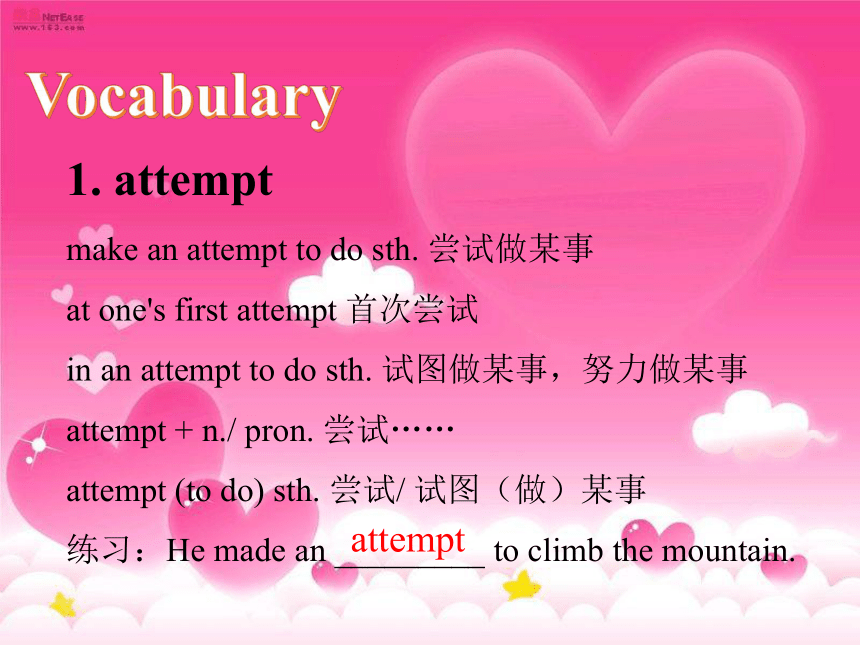
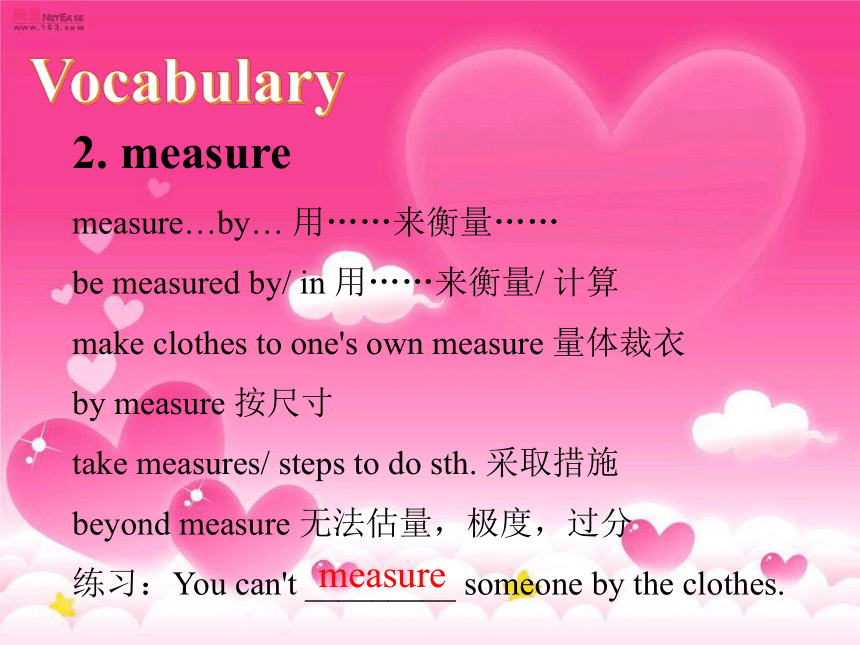
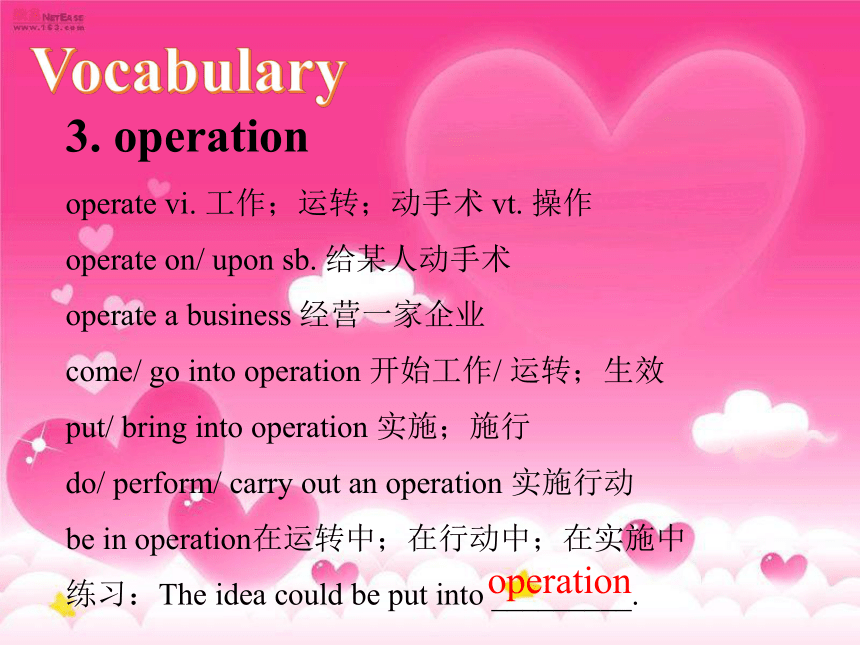


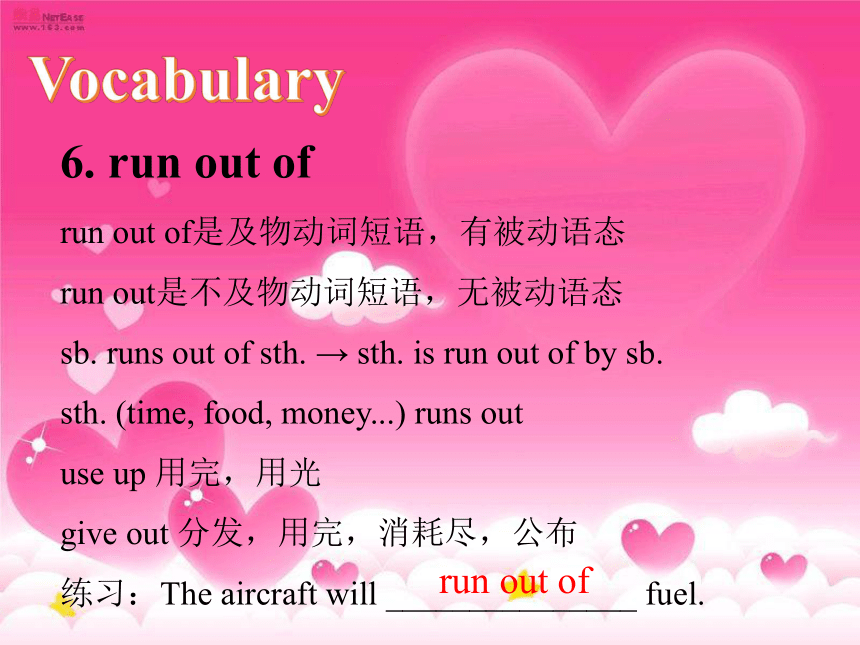
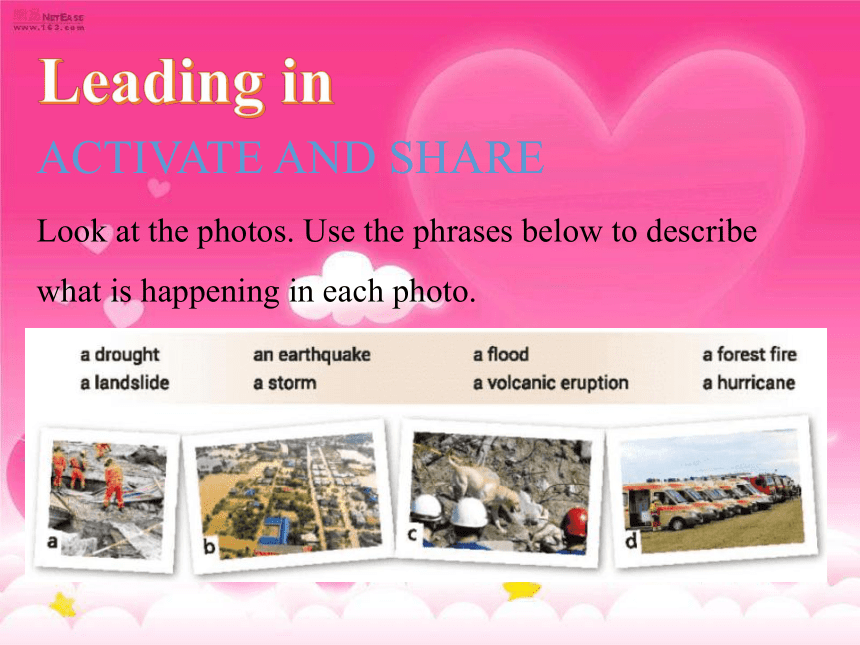

文档简介
(共21张PPT)
Unit 5 Humans and Nature
Lesson 2 Professional Rescue Team
Vocabulary
1. attempt
make an attempt to do sth. 尝试做某事
at one's first attempt 首次尝试
in an attempt to do sth. 试图做某事,努力做某事
attempt + n./ pron. 尝试……
attempt (to do) sth. 尝试/ 试图(做)某事
练习:He made an _________ to climb the mountain.
attempt
2. measure
measure…by… 用……来衡量……
be measured by/ in 用……来衡量/ 计算
make clothes to one's own measure 量体裁衣
by measure 按尺寸
take measures/ steps to do sth. 采取措施
beyond measure 无法估量,极度,过分
练习:You can't _________ someone by the clothes.
measure
Vocabulary
3. operation
operate vi. 工作;运转;动手术 vt. 操作
operate on/ upon sb. 给某人动手术
operate a business 经营一家企业
come/ go into operation 开始工作/ 运转;生效
put/ bring into operation 实施;施行
do/ perform/ carry out an operation 实施行动
be in operation在运转中;在行动中;在实施中
练习:The idea could be put into _________.
operation
Vocabulary
4. suffering
suffer vt. 遭受,经历,忍受 vi. 受苦;患病;受损失
sufferer n. 患病者,受苦者,受难者
suffer pain/ defeat/ loss/ poverty/ hunger/ hardship 遭受痛苦/ 失败/ 损失/ 贫穷/ 饥饿/ 苦难
suffer from… 受……折磨,受……之苦,患病
练习:This war has caused widespread human _________.
suffering
Vocabulary
5. protection
under the protection of 在……的保护下
afford/ give/ provide protection 提供保护
receive protection 受到保护
a protection against/ from 防御……的保护物
protect vt. 保护
protect… from… 保护……免受……
protect…against… 保护……免遭……的危害
练习:This hat will give ____________ against the sun.
protection
Vocabulary
6. run out of
run out of是及物动词短语,有被动语态
run out是不及物动词短语,无被动语态
sb. runs out of sth. → sth. is run out of by sb.
sth. (time, food, money...) runs out
use up 用完,用光
give out 分发,用完,消耗尽,公布
练习:The aircraft will _______________ fuel.
run out of
Vocabulary
Leading in
Look at the photos. Use the phrases below to describe what is happening in each photo.
ACTIVATE AND SHARE
Leading in
Match the photos (a–d) with the descriptions (1–4).
( ) 1 Search and rescue vehicles are brought into destroyed areas.
( ) 2 Trained dogs are used to help search for anyone who is still alive.
( ) 3 Rescue teams try to save people trapped under buildings.
( ) 4 Many houses are destroyed by the terrible flood.
ACTIVATE AND SHARE
d
c
a
b
Listen to the first part of the interview. Answer the questions
LISTEN FOR UNDERSTANDING
1. What is the interview about
The interview is about what search and rescue teams do when a natural disaster happens.
2. Who is the interviewee
The interviewee is Mr Wang, who is from China International Search and Rescue Team.
3. Which two disasters are mentioned
They mentioned two disasters, namely the Wenchuan earthquake, the Nepal earthquake.
Listen again. Complete the sentences. Then decide if the sentences contain a main idea (MI) about rescue attempts or a detail (D). Write the correct letter in the brackets.
LISTEN FOR UNDERSTANDING
What happens on rescue attempts
1. Our first and most important goal is to ______________. ( )
2. We use _______________________ vehicles and _____________ to look for anyone who is still alive.( )
save lives
MI
search and rescue
trained dogs
D
LISTEN FOR UNDERSTANDING
3. In a rescue attempt during the Nepal earthquake:
Over _________ members and ______ dogs took part, and we were there for _________ days. ( )
We rescued _______ people and provided medical help to over _________ people. ( )
4. It's our duty to try to reduce ____________ and _________________. ( )
sixty
six
twelve
D
two
2,000
D
suffering
the loss of life
MI
Pair Work
Suggested answers:
1. What is the most important goal of search and rescue attempts
2. How do rescue teams search for people who might be alive
3. Who took part in the rescue attempt in Nepal after the earthquake How many people did they help
4. What is Mr Wang's attitude towards his job
Work out four questions you may ask according to the information in Activity 3. Then ask and answer the questions.
Listen to the second part of the interview. What advice does Mr Wang give about surviving an earthquake when you're outdoors, indoors or trapped
FOCUS ON FUNCTION: MAINTAINING,
INTERRUPTING AND ENDING A CONVERSATION
Outdoors Indoors Trapped
_____________________ from any buildings or streetlights. __________________ anything that can break or fall. _______________ to help people find you and __________ when someone is nearby.
Stay there and move away
Stay away from
Knock on a wall
only shout
Maintaining, Interrupting and Ending a Conversation
1. Excuse me, Mr Wang, but can l interrupt you there ( )
2. OK, if I'm outdoors, … ( )
3. Sorry, but my advice is to ... ( )
Listen and imitate. Decide whether the phrases in italics are used to: maintain (M), interrupt (I) or end (E) a conversation. Write the correct letter in the brackets.
FOCUS ON FUNCTION: MAINTAINING,
INTERRUPTING AND ENDING A CONVERSATION
I
M
I
Maintaining, Interrupting and Ending a Conversation
4. Sorry for interrupting again ... ( )
5. Well, I'd love to know more, but, unfortunately, we've run out of time. ( )
6. So, I'm very sorry, but we'll have to finish there. ( )
Listen and imitate. Decide whether the phrases in italics are used to: maintain (M), interrupt (I) or end (E) a conversation. Write the correct letter in the brackets.
FOCUS ON FUNCTION: MAINTAINING,
INTERRUPTING AND ENDING A CONVERSATION
I
E
E
To interrupt
1. Do you mind if I interrupt
2. I'd like to add something to that, …
3. I beg your pardon, but I need to say something.
What are polite ways to interrupt and end a conversation Can you find more expressions Write them below.
FOCUS ON FUNCTION: MAINTAINING,
INTERRUPTING AND ENDING A CONVERSATION
To end
1. It's been great talking with you.
2. Please excuse me, I have to …
3. Please get in touch if I can help you in any way.
What are polite ways to interrupt and end a conversation Can you find more expressions Write them below.
FOCUS ON FUNCTION: MAINTAINING,
INTERRUPTING AND ENDING A CONVERSATION
Practise maintaining, interrupting and ending a conversation in the following situations. Use the expressions in the Talk Builder to help you.
SPEAK
Pair Work
Situation 1: Two friends talking on the phone
Friend 1: talking about his/ her worries for the next day's presentation
Friend 2: needs to end the conversation so as to catch a train
Practise maintaining, interrupting and ending a conversation in the following situations. Use the expressions in the Talk Builder to help you.
SPEAK
Pair Work
Situation 2: An English teacher and a student in an English class
English teacher: explaining how to use relative clauses
Student: needs to interrupt so as to ask a question
Unit 5 Humans and Nature
Lesson 2 Professional Rescue Team
Vocabulary
1. attempt
make an attempt to do sth. 尝试做某事
at one's first attempt 首次尝试
in an attempt to do sth. 试图做某事,努力做某事
attempt + n./ pron. 尝试……
attempt (to do) sth. 尝试/ 试图(做)某事
练习:He made an _________ to climb the mountain.
attempt
2. measure
measure…by… 用……来衡量……
be measured by/ in 用……来衡量/ 计算
make clothes to one's own measure 量体裁衣
by measure 按尺寸
take measures/ steps to do sth. 采取措施
beyond measure 无法估量,极度,过分
练习:You can't _________ someone by the clothes.
measure
Vocabulary
3. operation
operate vi. 工作;运转;动手术 vt. 操作
operate on/ upon sb. 给某人动手术
operate a business 经营一家企业
come/ go into operation 开始工作/ 运转;生效
put/ bring into operation 实施;施行
do/ perform/ carry out an operation 实施行动
be in operation在运转中;在行动中;在实施中
练习:The idea could be put into _________.
operation
Vocabulary
4. suffering
suffer vt. 遭受,经历,忍受 vi. 受苦;患病;受损失
sufferer n. 患病者,受苦者,受难者
suffer pain/ defeat/ loss/ poverty/ hunger/ hardship 遭受痛苦/ 失败/ 损失/ 贫穷/ 饥饿/ 苦难
suffer from… 受……折磨,受……之苦,患病
练习:This war has caused widespread human _________.
suffering
Vocabulary
5. protection
under the protection of 在……的保护下
afford/ give/ provide protection 提供保护
receive protection 受到保护
a protection against/ from 防御……的保护物
protect vt. 保护
protect… from… 保护……免受……
protect…against… 保护……免遭……的危害
练习:This hat will give ____________ against the sun.
protection
Vocabulary
6. run out of
run out of是及物动词短语,有被动语态
run out是不及物动词短语,无被动语态
sb. runs out of sth. → sth. is run out of by sb.
sth. (time, food, money...) runs out
use up 用完,用光
give out 分发,用完,消耗尽,公布
练习:The aircraft will _______________ fuel.
run out of
Vocabulary
Leading in
Look at the photos. Use the phrases below to describe what is happening in each photo.
ACTIVATE AND SHARE
Leading in
Match the photos (a–d) with the descriptions (1–4).
( ) 1 Search and rescue vehicles are brought into destroyed areas.
( ) 2 Trained dogs are used to help search for anyone who is still alive.
( ) 3 Rescue teams try to save people trapped under buildings.
( ) 4 Many houses are destroyed by the terrible flood.
ACTIVATE AND SHARE
d
c
a
b
Listen to the first part of the interview. Answer the questions
LISTEN FOR UNDERSTANDING
1. What is the interview about
The interview is about what search and rescue teams do when a natural disaster happens.
2. Who is the interviewee
The interviewee is Mr Wang, who is from China International Search and Rescue Team.
3. Which two disasters are mentioned
They mentioned two disasters, namely the Wenchuan earthquake, the Nepal earthquake.
Listen again. Complete the sentences. Then decide if the sentences contain a main idea (MI) about rescue attempts or a detail (D). Write the correct letter in the brackets.
LISTEN FOR UNDERSTANDING
What happens on rescue attempts
1. Our first and most important goal is to ______________. ( )
2. We use _______________________ vehicles and _____________ to look for anyone who is still alive.( )
save lives
MI
search and rescue
trained dogs
D
LISTEN FOR UNDERSTANDING
3. In a rescue attempt during the Nepal earthquake:
Over _________ members and ______ dogs took part, and we were there for _________ days. ( )
We rescued _______ people and provided medical help to over _________ people. ( )
4. It's our duty to try to reduce ____________ and _________________. ( )
sixty
six
twelve
D
two
2,000
D
suffering
the loss of life
MI
Pair Work
Suggested answers:
1. What is the most important goal of search and rescue attempts
2. How do rescue teams search for people who might be alive
3. Who took part in the rescue attempt in Nepal after the earthquake How many people did they help
4. What is Mr Wang's attitude towards his job
Work out four questions you may ask according to the information in Activity 3. Then ask and answer the questions.
Listen to the second part of the interview. What advice does Mr Wang give about surviving an earthquake when you're outdoors, indoors or trapped
FOCUS ON FUNCTION: MAINTAINING,
INTERRUPTING AND ENDING A CONVERSATION
Outdoors Indoors Trapped
_____________________ from any buildings or streetlights. __________________ anything that can break or fall. _______________ to help people find you and __________ when someone is nearby.
Stay there and move away
Stay away from
Knock on a wall
only shout
Maintaining, Interrupting and Ending a Conversation
1. Excuse me, Mr Wang, but can l interrupt you there ( )
2. OK, if I'm outdoors, … ( )
3. Sorry, but my advice is to ... ( )
Listen and imitate. Decide whether the phrases in italics are used to: maintain (M), interrupt (I) or end (E) a conversation. Write the correct letter in the brackets.
FOCUS ON FUNCTION: MAINTAINING,
INTERRUPTING AND ENDING A CONVERSATION
I
M
I
Maintaining, Interrupting and Ending a Conversation
4. Sorry for interrupting again ... ( )
5. Well, I'd love to know more, but, unfortunately, we've run out of time. ( )
6. So, I'm very sorry, but we'll have to finish there. ( )
Listen and imitate. Decide whether the phrases in italics are used to: maintain (M), interrupt (I) or end (E) a conversation. Write the correct letter in the brackets.
FOCUS ON FUNCTION: MAINTAINING,
INTERRUPTING AND ENDING A CONVERSATION
I
E
E
To interrupt
1. Do you mind if I interrupt
2. I'd like to add something to that, …
3. I beg your pardon, but I need to say something.
What are polite ways to interrupt and end a conversation Can you find more expressions Write them below.
FOCUS ON FUNCTION: MAINTAINING,
INTERRUPTING AND ENDING A CONVERSATION
To end
1. It's been great talking with you.
2. Please excuse me, I have to …
3. Please get in touch if I can help you in any way.
What are polite ways to interrupt and end a conversation Can you find more expressions Write them below.
FOCUS ON FUNCTION: MAINTAINING,
INTERRUPTING AND ENDING A CONVERSATION
Practise maintaining, interrupting and ending a conversation in the following situations. Use the expressions in the Talk Builder to help you.
SPEAK
Pair Work
Situation 1: Two friends talking on the phone
Friend 1: talking about his/ her worries for the next day's presentation
Friend 2: needs to end the conversation so as to catch a train
Practise maintaining, interrupting and ending a conversation in the following situations. Use the expressions in the Talk Builder to help you.
SPEAK
Pair Work
Situation 2: An English teacher and a student in an English class
English teacher: explaining how to use relative clauses
Student: needs to interrupt so as to ask a question
同课章节目录
- Unit 4 Information technology
- Lesson 1 Avatars
- Lesson 2 Apps
- Lesson 3 Internet and Friendships
- Unit 5 Humans and nature
- Lesson 1 A Sea Story
- Lesson 2 Professional Rescue Team
- Lesson 3 Race to the Pole
- Unit 6 The admirable
- Lesson 1 A Medical Pioneer
- Lesson 2 History Makers
- Lesson 3 The Superhero Behind Superman
